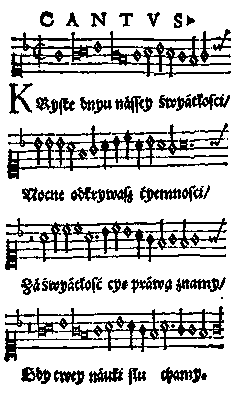|
POLISH EARLY MVSIC |
Composers | Essays | Sources | Feedback | Editorial |
Wacław z Szamotuł (or: Wacław Szamotulski) (ca.1520 - ca.1560)
Wacław of Szamotuły (Venceslaus Samotulinus, Schamotulinus, Samotulius) was born after 1520 in Szamotuły, in the vicinity of Poznań, into a middle-class family. He started his education in Posnanian Lubranscianum then studied at the University of Cracow, which by that time had become the centre of Humanism. While serving as secretary at the court of Hieronim Chodkiewicz, he published a number of occasional panegyrics written in verse. But he must have already been known as a distinguished composer, for in 1547 he was appointed to the court of King Sigismund Augustus as a composer to the Royal Chapel.
 He worked at the King's court until the end of 1555 (which means, for 8 and a half years) - till this time his salaries are "posted". He didn't teach young singers (although royal composers normally had such a duty) because of a "lack of voice". It is probably from this period that the following works and collections of works date: the fragmentary Lamentationes [et Exclamationes Passionum 4 vocum] (published in Cracow in 1553); the motets In te Domine speravi (1554) and Ego sum pastor bonus (1564), printed in the Nuremberg collection of Berg and Neuber; the motet Nunc scio vere preserved in a tabulature manuscript transcription from the 16th century. Other works probably of the same period today are only known through their titles: Mass 8 vocum, two collections of Offices (for 4 and 6 voices), Exclamationes 5 vocum, and an occasional piece commemorating the royal wedding in 1553. His authorship can be recognized through the initials he used in scores: V.S. or W.S. The seventeenth-century historian Szymon Starowolski relates (in Scriptorum Polonicorum Hekatontas of 1625), without giving any details, that Wacław also composed some works ad oblectationem animorum honestam (for appropriate amusement).
He worked at the King's court until the end of 1555 (which means, for 8 and a half years) - till this time his salaries are "posted". He didn't teach young singers (although royal composers normally had such a duty) because of a "lack of voice". It is probably from this period that the following works and collections of works date: the fragmentary Lamentationes [et Exclamationes Passionum 4 vocum] (published in Cracow in 1553); the motets In te Domine speravi (1554) and Ego sum pastor bonus (1564), printed in the Nuremberg collection of Berg and Neuber; the motet Nunc scio vere preserved in a tabulature manuscript transcription from the 16th century. Other works probably of the same period today are only known through their titles: Mass 8 vocum, two collections of Offices (for 4 and 6 voices), Exclamationes 5 vocum, and an occasional piece commemorating the royal wedding in 1553. His authorship can be recognized through the initials he used in scores: V.S. or W.S. The seventeenth-century historian Szymon Starowolski relates (in Scriptorum Polonicorum Hekatontas of 1625), without giving any details, that Wacław also composed some works ad oblectationem animorum honestam (for appropriate amusement).
From about 1550 Wacław also wrote some simple songs for 4 voices, to Polish texts, which belonged to the religious repertory of the Polish Reformation: 8 compositions of this type are known. Around the end of 1555 the composer became engaged even more actively in the work of the Reformation movement - without formally resigning his position at the royal court - in Vilna at the court of one of the mightiest adherents of the Reformation, the Voivode Mikołaj Radziwiłł. There's the only vestige of this stay: a note on the cover of a song-book printed in Brzesć Litewski (from which only a few pages remained as photocopies to our days).
Wacław died about 1560 in Pi?czów, being about 34 years old. The previous date - 1572 (from Starowolski's relation) - was questioned already in 1826. There an elegy exists, written down in ca. 1560 by Andrzej Trzecieski, friend of Wacław, commemorating his recent death. The motet "In te Domine speravi" appeared in print in a collection of works entitled Tomvs Qvartvs Psalmorvm Selectorvm, Qvarvor Et Plvrivm Vocvm. Norimbergae, in officina Ioannis Montani, et Vlrici Neuberi, Anno salutis MDLIII. In this volume it occupied the seventeenth place.
(Quoted from CD cover; supplied by BK)

The history of Wacław z Szamotuł (W. of Szamotuły) was a history of bad luck for Polish early music. He was a gifted man, a true Renaissance figure. Educated in law, mathematics and philosophy, Wac?aw of Szamotuły was also a poet writing in Latin as well as in Polish. He died early, about the age of 35. "If the Gods had let him live longer, the Poles would have no need to envy the Italians their Palestrina, Lappi and Viadana", wrote Szymon Starowolski, the author of the first concise biography of Wacław of Szamotuły and certainly one has to agree with him. The second part of the bad luck was the fact, that precariously few of his compositions remained until recent times.
The following list contains all of his surviving compositions known to this day:
Sacred vocal:
But let's be optimistic: Many of the Polish EM pieces were discovered only after World War II (See Gorczycki). So I hope somebody will still find more music of Wacław of Szamotuły in some forgotten church records as well...